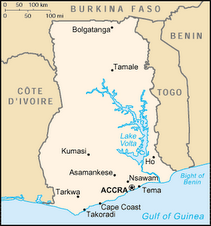Clinical patients recently presented with a swallowed needle, ruptured eardrums, a Guinea worm abcess of the forehead, and hearing loss and tinnitus from chloroquin treated malaria. The Karl Storz telescopes were helpful in treating the seamstress who swallowed the needle. Several surgeries were successful but the lack of monitors caused post-operative concern about hypoxia and hypotension. Tyco-Nellcor and Respironics pulse oximeters will be put to good use. Electrical failures are frequent and I should have listened to Dr. Chang's suggestion of accepting Surgitel's battery powered headlight. Road accident deaths are numerous; it is foolish to be on the road a night.
I found the hospital to be full of broken medical equipment which was previously donated without provisions for maintenance. Today, 80 % of this old otolaryngology equipment had to be discarded because it was beyond repair. A section of the roof has been leaking and because of the recent heavy rains, the audiology suite was flooded. During the roof's repair, the hospital's main electrical cables were found to be rotten - a potential fire hazard and possible hospital closure. An electrician is due to evaluate.
I have bee bringing in new equipment gradually from an off-site warehouse. Now that the ear, nose and throat departmetn has more space, we can bring in additional supplies once security is assured.
Wednesday, August 22, 2007
Monday, August 13, 2007
Tamale Regional Teaching Hospital
Tamle Regional Teaching Hospital consists of eight separate wards and laboratory buildings, ten physicians, and 500 employees for Tamale's 350,00 and the Northern Region's 2 million inhabitants. The hospital's electrical power and water supply (which requires electricity) are intermittent. Operations have to be terminated when the electrical power fails. Voltage surges destroy electrical equipment and voltage regulators will have to be purchased. In contrast to the spartan hospital facilities, the Chinese under Ghanaian contract, built a new 50,000 seat football (soccer) stadium for the upcoming 2008 Pan African Cup!
This past week, three patients with profound hearing loss (typical candidates for cochlear implants), a ten year-old with bilateral complete stenosis of the ear canals causing deafness, and an accident victim with loss of skin to the anterior neck, requiring a skin graft were seen. The child with the canal stenosis and the accident victim will be scheduled for surgery. Cochlear implants are not available.
A presentation will be made on August 15 to the Tamale Rotarians for their support with "Project C.U.R.E." in sending medical supplies to the hospital. This effort will be in conjunction with the Rotary Club of Kearny, NJ in the U.S.
It has been pleasant and rewarding to work with a 70% Muslim population, experience the torrential downpours, and learn "Dagbani," the language of the Dagomba. Not so pleasant has been recovering from food poisoning and trying to transfer funds to the local Barclays Bank and/or SG-SSB bank without ensuing their 2.5% charge. And last night's particular experience: after just lathering up my entire body with soap & shampoo in the shower, the water failed. Had to resort to toweling off all the soap & felt like a Roman of the first century who depended on oils to cleanse himself. Hoped Cyndy would appreciate the sweet smell but she was already fast asleep.
Your blog comments and emails to our gmail account are much appreciated!
This past week, three patients with profound hearing loss (typical candidates for cochlear implants), a ten year-old with bilateral complete stenosis of the ear canals causing deafness, and an accident victim with loss of skin to the anterior neck, requiring a skin graft were seen. The child with the canal stenosis and the accident victim will be scheduled for surgery. Cochlear implants are not available.
A presentation will be made on August 15 to the Tamale Rotarians for their support with "Project C.U.R.E." in sending medical supplies to the hospital. This effort will be in conjunction with the Rotary Club of Kearny, NJ in the U.S.
It has been pleasant and rewarding to work with a 70% Muslim population, experience the torrential downpours, and learn "Dagbani," the language of the Dagomba. Not so pleasant has been recovering from food poisoning and trying to transfer funds to the local Barclays Bank and/or SG-SSB bank without ensuing their 2.5% charge. And last night's particular experience: after just lathering up my entire body with soap & shampoo in the shower, the water failed. Had to resort to toweling off all the soap & felt like a Roman of the first century who depended on oils to cleanse himself. Hoped Cyndy would appreciate the sweet smell but she was already fast asleep.
Your blog comments and emails to our gmail account are much appreciated!
Monday, August 6, 2007
Successful Arrival of Container
The 40 ft container of medical equipment having successfully arived intact one week ago is now secuely warehoused nearby. Little by little, distribution & utilization of the equipment should be accomplished and hospital security measures put in place. Tamale Regional Teaching Hospital has problems with intermittent electrical & water supply. Dr. Seth Wange, the Ghanaian ophthalmologist, had to finish four cataract operations with a flashlight when the electrical power unexpectedly failed. There is only intermittent running water in the ear, nose & throat clinic & the entire hospital is in need of painting.
Once every two weeks, four tonsillectomies are performed by a visiting physician who has had 18 months of otolaryngology training. He does a good tonsillectomy without available cautery. The nurse anesthetist is impressive in his technique & concern for the patient. Sterilization is with boiling water.
Patients with profound hearing loss, absence of speech, delayed speech, Bell's facial paralysis & many cases of external otitis & allergic rhino-pharyngitis were seen in the past two days at the ENT clinic. Mr. Kadiri, the ENT nurse, does a good job. Three schools for the deaf have over 1,000 children overall.
There is certainly a need for an otolaryngology specialist here in the Northern Region. The hospital staff are warm, receptive, helpful, & eager to learn and the patients are very appreciative.
Once every two weeks, four tonsillectomies are performed by a visiting physician who has had 18 months of otolaryngology training. He does a good tonsillectomy without available cautery. The nurse anesthetist is impressive in his technique & concern for the patient. Sterilization is with boiling water.
Patients with profound hearing loss, absence of speech, delayed speech, Bell's facial paralysis & many cases of external otitis & allergic rhino-pharyngitis were seen in the past two days at the ENT clinic. Mr. Kadiri, the ENT nurse, does a good job. Three schools for the deaf have over 1,000 children overall.
There is certainly a need for an otolaryngology specialist here in the Northern Region. The hospital staff are warm, receptive, helpful, & eager to learn and the patients are very appreciative.
Subscribe to:
Posts (Atom)

